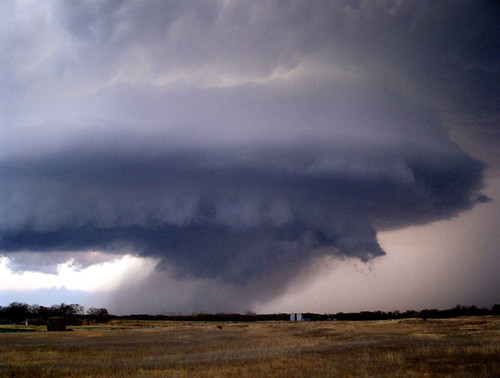Showing posts with label cloud. Show all posts
Showing posts with label cloud. Show all posts
Monday, April 19, 2010
A basic introduction to the Cloud
I've been getting requests recently to give a high-level overview of "The Cloud". What it means, why people are excited, and what they should care. I decided to put together a basic introduction of the Cloud (embeded below). Feel free to use parts of this in your own presentations, and I'd love to hear feedback on this:
Thursday, March 18, 2010
Tuesday, March 16, 2010
How to Trust the Cloud
Next week I head off to Beijing, China to speak at Cloud Computing Congress China. Below is a sneak peek at the talk I plan to give (let me know what you think!):
Wednesday, March 3, 2010
Cloud photos for presentations and documents
I've been working on a talk I'm giving at Cloud Computing Congress in China and (I'm not ashamed to admit) I spent a lot of time looking for just the right cloud photo. I thought I'd share the best photo's I came across, in case you ever need to give a talk about The Cloud (or just love photo's of clouds).
Note: These photos are all be licensed under Creative Commons, and came from a combination of Flickr Creative Commons search and Google Images (manually excluding non-Creative Commons images).





You can find all of these cloud photos here. If you have other favorites and are willing to share, please add a link to them in the comments.
The photos are divided into four sections:
Simple clouds
Dark clouds





Powerful clouds
Unique clouds
You can find all of these cloud photos here. If you have other favorites and are willing to share, please add a link to them in the comments.
Labels:
cloud,
cloud computing,
presentations,
slides
Friday, February 26, 2010
The top 7 most overused cloud metaphors, sorted by weather pattern
Along with innovation, agility, and efficiency cloud computing has brought us a bevy of clever metaphors around the cloud concept. Unfortunately these play-on-words headlines are quickly becoming cliches. Below is a list of the most common metaphors I've come across, and headlines that use them. I hope this list will force us all to be a bit more original. (Note: Sorted by weather event chronological order)
Partly Cloudy
Dark Lining
Dark Side
Bursting
Rain
Clearing the Air
Silver Lining
- Not Every Cloud has a Silver Lining
- Is Integration Cloud Computing's Silver Lining?
- Not every cloud has a silver lining
- Is Google Chrome OS cloud computing's silver lining?
- Cloud Computing Is Silver Lining in Tough Economy
Bonus: aaS
Have you come across any others? Let me know and I'll update this post.
Wednesday, January 20, 2010
Advice for Rackspace on communicating status updates
To the hard working employees of Rackspace:
Your hosting rocks, your customer service is consistently impressive, and your colleagues are extremely talented. Here's my concern. If I'm a customer, and I'm seeing issues with my Rackspace servers/apps/cloud, I have to quickly determine which of the the following places will tell me what's going on:
- Rackspace Status Twitter account (http://twitter.com/RackStatus)
- The Rackspace Cloud System Status (http://status.rackspacecloud.com/)
- Rackspace Email & Apps System Status Page (http://status.apps.rackspace.com/)
- The Official Rackspace Blog (http://www.rackspace.com/blog/)
- The Rackspace Cloud Blog (http://www.rackspacecloud.com/blog/)
- Rackspace Cloud Twitter account (http://twitter.com/rackcloud)
- Rackspace Twitter account (http://twitter.com/rackspace)
I presume there is a rational explanation for this. I even see a hint of method to this madness. Unfortunately when your customers are in a rush to figure out why their website is collapsing, they won't be in the mood to think about this rationally. Rackspace may be one of the the most experienced companies on the planet when it comes to dealing with frantic people. I would suggest taking some of that experience and putting it to work in raising the bar industry-wide for communicating status updates to your customers. To get you started, here are some ideas:
Suggestions to get you started
- Consolidate all of your status updates at a single destination. Possibly at http://status.rackspace.com/? If nothing else, have a page there that points visitors to the best place to get updates for their specific service. Link customers to this page from your front page, support portals, and blogs.
- Work to get Google/Yahoo/Bing/etc to point to this page for searches such as "rackspace status", "rackspace cloud status", "rackspace health", "rackspace uptime".
- You're going in the right direction with the the Email & Apps System Status Page. I would follow this model for your entire service suite (versus the simple blog style).
- If you want to differentiate from your competition, you have a number of options. Read this, this, and this.
- Continue tweeting, blogging, and Scobleizing. The more communication channels and approaches the better. Just don't make people have to hunt around in a time of need.
You guys are doing all of the hard parts well. You are also in a unique position to understand the benefits of transparency and communication. With a little bit of work, you have the opportunity to create more fans, reduce support costs, and push the industry forward in an important area.
Update: Within 5 minutes of posting this, Robert Scoble pointed me to a Twitter list merging all of the Rackspace twitter accounts:
A great resource, though clearly not something that would be easy to find quickly.
Monday, January 18, 2010
Real-time timeline of cloud health status updates
Putting the combined cloud health status feed mentioned in the previous post on a timeline offers us convenient way to tell what's been going on with each of the cloud providers, and with the cloud in general:
It may be useful to break out each cloud into a separate feed/timeline as well, if you're hosted on a single cloud. If there is interest, I'll post those as well.
It may be useful to break out each cloud into a separate feed/timeline as well, if you're hosted on a single cloud. If there is interest, I'll post those as well.
Labels:
amazon,
app engine,
cloud,
gogrid,
rackspace
Thursday, January 14, 2010
Cloud health RSS feed
You may have noticed I've added a new module to the right side of this blog. This is a new feed I created (using Yahoo Pipes) combining the status update feeds of all of the major cloud providers (who offer feeds), in affect creating a single stream of cloud health status. Feel free to play with the pipe and add anything I may have missed.
Update: Improved on the original pipe by prepending each cloud feed with it's name, to more easily tell which cloud is reporting the problem:
Wednesday, November 12, 2008
Zoho opens up their kimono and the blogosphere applauds
Big news from Zoho (provider of online applications and services that compete with Google and Microsoft). As of yesterday, they have reached the next level in uptime transparency by launching Zoho Service Health Status! As Raju Vegesna states in their big announcement, "This initiative is yet another step to being more open and transparent with our users." Kudos to Zoho for recognizing the need and delivering. They join Amazon AWS and SalesForce as the three large service providers offering a very public health dashboard of their services.
I'm really excited to see that the blogosphere gets the significance of this move:
Mashable:
WebWorkerDaily:
Who's next to open up? I'm looking at you Google!
I'm really excited to see that the blogosphere gets the significance of this move:
Mashable:
"One frequent problem with web applications and services - and thus the whole web 2.0 phenomenon - is lack of communication when something goes wrong. Sure, it’s nice to have your online e-mail client available from every computer, but what happens when it goes down? Often, it’s just you in the dark, waiting for problems to be resolved, with little or no official information on what’s happening to ease your mind...
This is a great idea. If something goes wrong with any one of Zoho’s applications, you can quickly check out if the problem is on your side or theirs. Of course, I’m sure that the folks at Zoho will continue to inform their customers about problems, updates, downtime and similar issues via blog posts, but being able to see what’s wrong for yourself, at any given time, is an advantage Zoho’s customers will certainly enjoy. All other web startups take notice: this is the level of transparency we’d like to see from everyone, not just Zoho."
WebWorkerDaily:
"After taking a look, I’d say that all applications hosted online could benefit from this level of kimono-opening."CNET:
"Web application specialist Zoho has joined the growing ranks of companies willing to share detailed information on how well their online services are holding up.This move toward transparency is increasingly important as potential customers consider relying on such services...
Publishing the performance measurements for online services is catching on as cloud computing grows more serious. Going hand in hand with that is offering service level agreements (SLAs) with specific uptime commitments."
Who's next to open up? I'm looking at you Google!
Subscribe to:
Posts (Atom)





































